MyBatis-XML Schema
1. Brief Description - Differences from Notes
Execution efficiency: same
Speed of development: faster annotations
Easy maintenance: Notes are simpler.
Old company, old projects still use XML
2. Environmental Setup
1. Make sure the database has been created
2. Import jar package & core configuration file
3. (XML only) Create mapper package and import mapper.xml mapping file

4. Create a package package and import the MybatisUtils tool
5. Define JavaBean
User class:
public class User implements Serializable {
private Integer uid;
private String username;
private Date birthday;
private String sex;
private String address;// get set Reference or no reference toString
}
6. (XML only) Define Dao & Set Mapper.xml & Register Mapper

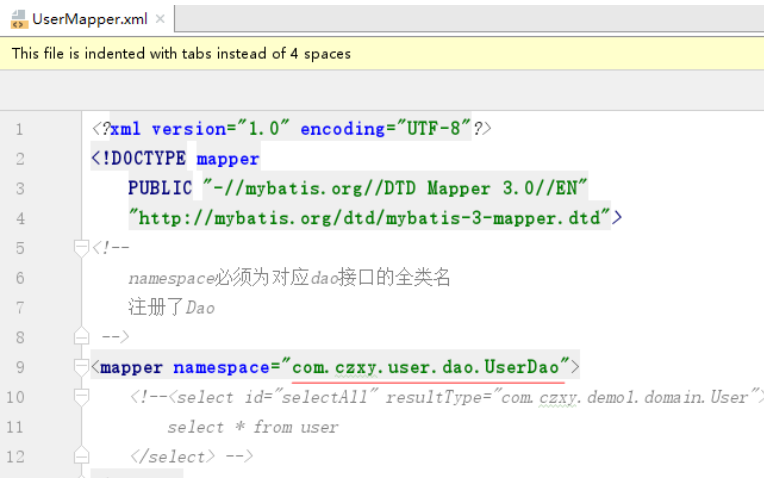
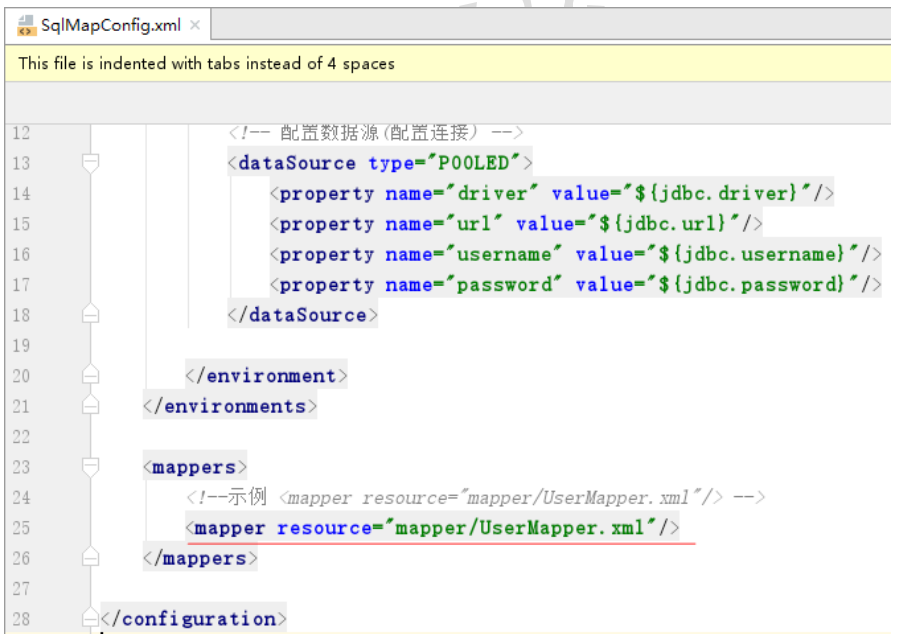
3. Getting Started Cases - Query All
Code implementation'
Test class:
/**
*Case 1: Query all
*/
@Test
public void run1(){
//1. Get Dao Objects
UserDao dao = MyBatisUtils.getMapper(UserDao.class);
//2. Call Dao Object
List<User> ulist = dao.selectAll();
System.out.println(ulist);
//3. Close Session
MyBatisUtils.close();
}
UserDao: (no SQL statement)
List<User> selectAll();
UserMapper.xml (unique to XML)
<mapper namespace="com.czxy.user.dao.UserDao">
<!--
In corresponding notes select
id="Method name in interface"
resultType="Return Value Type"
-->
<select id="selectAll" resultType="com.czxy.user.domain.User">
select * from user
</select>
</mapper>
Differences between annotations and XML styles (Understanding)
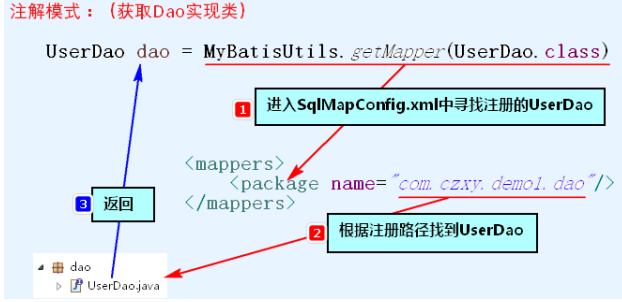
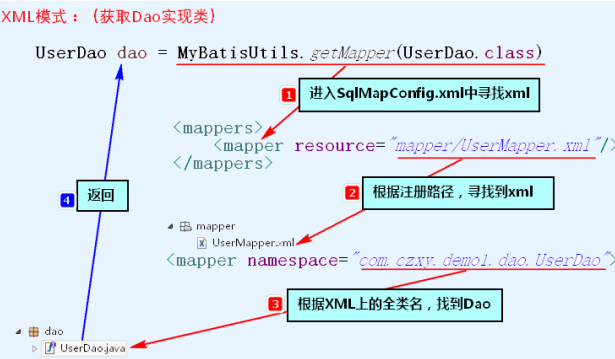
Annotation is an alternative to XML.
4. Advanced-Advanced [Key]
1. Query by ID
Test class:
/**
*Case 2: Query by ID
*/
@Test
public void run2(){
//1. Get Dao Objects
UserDao dao = MyBatisUtils.getMapper(UserDao.class);
//2. Call Dao Object
User user = dao.selectUserByUid(6);
System.out.println(user);
//3. Close Session
MyBatisUtils.close();
}
UserDao:
User selectUserByUid(@Param("uid") int i);
UserMapper.xml
<select id="selectUserByUid" resultType="com.czxy.user.domain.User">
select * from user where uid = #{uid}
</select>
2. Add
Test class:
/**
*Case 3: Add
*/
@Test
public void run3(){
//1. Get Dao Objects
UserDao dao = MyBatisUtils.getMapper(UserDao.class);
//2. Call Dao Object
User user = new User(null, "Brilliant sir", new Date(), "male", "Pandora Box");
int row = dao.insert(user);
System.out.println(row);
//3. Commit the transaction before closing the session
MyBatisUtils.commitAndClose();
}
UserDao:
int insert(User user);
UserMapper.xml
<!--
In corresponding notes insert
id="Method name in interface"
-->
<insert id="insert">
insert into user values (#{uid},#{username},#{birthday},#{sex},#{address})
</insert>
3. Modification
Test class:
/**
*Case 4: Modification
*/
@Test
public void run4(){
//1. Get Dao Objects
UserDao dao = MyBatisUtils.getMapper(UserDao.class);
//2. Call Dao Object
int row = dao.update("2010-01-01","female","Village",9);
System.out.println(row);
//3. Commit the transaction before closing the session
MyBatisUtils.commitAndClose();
}
UserDao:
int update(@Param("birthday")String birthday, @Param("sex")String sex, @Param("address")String address, @Param("uid")int uid);
UserMapper:
<update id="update">
update user set birthday=#{birthday},sex=#{sex},address=#{address} where uid=#{uid}
</update>
4. Delete
Test class:
/**
*Case 5: Delete
*/
@Test
public void run5(){
//1. Get Dao Objects
UserDao dao = MyBatisUtils.getMapper(UserDao.class);
//2. Call Dao Object
int row = dao.deleteByUid(5);
System.out.println(row);
//3. Commit the transaction before closing the session
MyBatisUtils.commitAndClose();
}
UserDao:
int deleteByUid(@Param("uid") int i);
UserMapper:
<delete id="deleteByUid">
delete from user where uid=#{uid}
</delete>
5. Summary
| annotation |
XML Schema |
| @Select |
<select id="method name"resultType="return value type"></select> |
| @Insert |
<insert id="method name"></ Insert > |
| @Update |
<update_id="method name"></ update > |
| @Delete |
<delete id="method name"></ delete > |
| @Param |
@Param Parameters are assigned and commented the same way |
6. Total number of records queried
select count(*) from user;
Test class:
/**
*Case 6: Total number of records queried
*/
@Test
public void run6(){
//1. Get Dao Objects
UserDao dao = MyBatisUtils.getMapper(UserDao.class);
//2. Call Dao Object
int count = dao.selectCount();
System.out.println(count);
//3. Close Session
MyBatisUtils.close();
}
UserDao:
int selectCount();
UserMapper.xml:
<select id="selectCount" resultType="int">
select count(*) from user
</select>
7. Conditional Query (Fixed SQL Statement)
Query: User name contains "ao" and all users with gender of "male"
Test class:
/**
* Case 7: Query: User name contains "ao" and all users of gender "male"
*/
@Test
public void run7(){
//1. Get Dao Objects
UserDao dao = MyBatisUtils.getMapper(UserDao.class);
//2. Call Dao Object
List<User> ulist = dao.selectUlistByParam("%ao%","male");
System.out.println(ulist);
//3. Close Session
MyBatisUtils.close();
}
UserDao:
List<User> selectUlistByParam(@Param("username") String username, @Param("sex") String sex);
UserMapper.xml:
<select id="selectUlistByParam" resultType="com.czxy.user.domain.User">
select * from user where username like #{username} and sex = #{sex}
</select>
8. Conditional Query (Dynamic SQL) [Key]
Query: User name contains "ao" and all users with gender of "male"
- If username is not passed, only gender is filtered
- If gender is not passed in, filter user names
- If neither user name nor gender is passed, query all
Dynamic SQL: Split different SQL statements according to different conditions
Modified UserMapper.xml:
<select id="selectUlistByParam" resultType="com.czxy.user.domain.User">
select * from user
<where>
<if test="username!=null and username!=''">
and username like #{username}
</if>
<if test="sex!=null and sex!=''">
and sex = #{sex}
</if>
</where>
</select>
9. Conditional Query (Dynamic SQL) [Key]
Query: data with uid 1 or 3 or 4 or 6
uid in (1,3,4,6)
Test class:
/**
* Case 8: Query: data with uid 1 or 3 or 4 or 6
*/
@Test
public void run8(){
//1. Get Dao Objects
UserDao dao = MyBatisUtils.getMapper(UserDao.class);
//2. Call Dao Object
List<Integer> ids = new ArrayList<>();
Collections.addAll(ids,1,3,4,6);
List<User> ulist = dao.selectUlistByUids(ids);
System.out.println(ulist);
//3. Close Session
MyBatisUtils.close();
}
UserDao:
List<User> selectUlistByUids(@Param("ids") List<Integer> ids);
UserMapper.xml:
<!--
collection: collection to traverse (equivalent to items in c:forEach)
item: Element traversed each time (equivalent to var in c:forEach)
open: Stitching before traversal
separator: Separation every traverse
close: stitching after traversal
-->
<select id="selectUlistByUids" resultType="com.czxy.user.domain.User">
select * from user
<where>
<foreach collection="ids" item="uid" open="uid in (" separator="," close=")">
#{uid}
</foreach>
</where>
</select>
Extension: Dynamic SQL annotated
UserDao:
@Select("<script>select * from user\n" +
"\t\t<where>\n" +
"\t\t\t<if test=\"username!=null and username!=''\">\n" +
"\t\t\t\tand username like #{username}\n" +
"\t\t\t</if>\n" +
"\t\t\t<if test=\"sex!=null and sex!=''\">\n" +
"\t\t\t\tand sex = #{sex}\n" +
"\t\t\t</if>\n" +
"\t\t</where></script>")
List<User> selectUlistByParam(@Param("username") String username, @Param("sex") String sex);
@Select("<script>select * from user\n" +
"\t\t<where>\n" +
"\t\t\t<foreach collection=\"ids\" item=\"uid\" open=\"uid in (\" separator=\",\" close=\")\">\n" +
"\t\t\t\t#{uid}\n" +
"\t\t\t</foreach>\n" +
"\t\t</where></script>")
List<User> selectUlistByUids(@Param("ids") List<Integer> ids);
The programmer opens two projects:
An XML way
A way to annotate
Write dynamic SQL in XML and migrate to annotation after testing.
Today's summary:
XML environment setup:
1. Determine if the database has been created
2. Import jar package & core configuration file
3. Create a mapper package and import the Mapper.xml file
4. Create a package package and import the MybatisUtils tool
5. Define JavaBeans, modify JavaBeans to reflect multitable relationships
6. Define Dao & Set Mapper.xml Mapping & Register Mapper.xml File
Dynamic SQL: Split different SQL statements according to different conditions
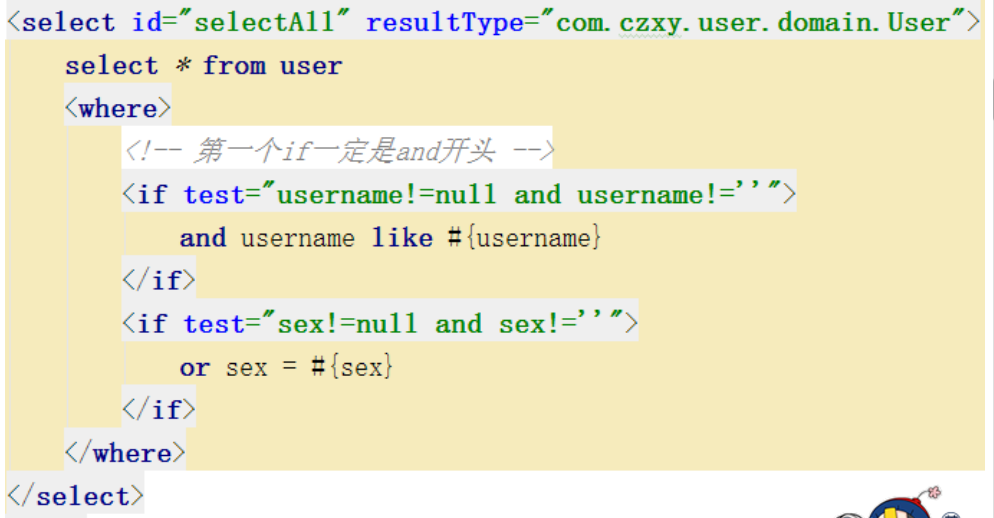

Please give yourself a compliment on your efforts!
Make a little progress every day `~~